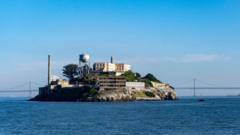The former U.S. President stated that he is directing the necessary federal agencies to reconstruct and reopen Alcatraz, a site historically linked to infamous criminals and cinematic lore.
In a recent post on his Truth Social platform, Donald Trump announced plans to revive Alcatraz, the notorious island prison closed since 1963, citing a rise in violent crime as a pressing issue. "America has been plagued by vicious, violent, and repeat criminal offenders," he stated. He believes that reopening Alcatraz will symbolize "law, order, and justice."
The revamped prison is envisioned to house the nation's "most ruthless and violent offenders," with plans for a substantial enlargement and rebuilding of the facilities. Trump directed the Bureau of Prisons and collaborated with the Department of Justice, FBI, and Homeland Security to outline this ambitious project.
Alcatraz, originally a military fort, was transformed into a federal prison in the 1930s, housing notorious inmates such as mobster Al Capone and criminal George "Machine Gun" Kelly. Beyond its nefarious history, the island has also captivated popular culture, inspiring films like "Birdman of Alcatraz" and "The Rock."
Trump's move comes amidst ongoing tension with courts over his criminal justice policies, particularly his controversial decision to send suspected gang members to prisons outside the U.S., such as one in El Salvador. As Alcatraz is positioned to make a comeback, questions arise about the logistical, financial, and ethical implications of operating a prison on the isolated island, notably its previous operational costs that were significantly higher than other federal institutions.
The proposal has ignited discussions on social media, reflecting a blend of support and skepticism regarding the effectiveness of returning to such a historic penal institution as a solution for modern-day crime challenges.
In a recent post on his Truth Social platform, Donald Trump announced plans to revive Alcatraz, the notorious island prison closed since 1963, citing a rise in violent crime as a pressing issue. "America has been plagued by vicious, violent, and repeat criminal offenders," he stated. He believes that reopening Alcatraz will symbolize "law, order, and justice."
The revamped prison is envisioned to house the nation's "most ruthless and violent offenders," with plans for a substantial enlargement and rebuilding of the facilities. Trump directed the Bureau of Prisons and collaborated with the Department of Justice, FBI, and Homeland Security to outline this ambitious project.
Alcatraz, originally a military fort, was transformed into a federal prison in the 1930s, housing notorious inmates such as mobster Al Capone and criminal George "Machine Gun" Kelly. Beyond its nefarious history, the island has also captivated popular culture, inspiring films like "Birdman of Alcatraz" and "The Rock."
Trump's move comes amidst ongoing tension with courts over his criminal justice policies, particularly his controversial decision to send suspected gang members to prisons outside the U.S., such as one in El Salvador. As Alcatraz is positioned to make a comeback, questions arise about the logistical, financial, and ethical implications of operating a prison on the isolated island, notably its previous operational costs that were significantly higher than other federal institutions.
The proposal has ignited discussions on social media, reflecting a blend of support and skepticism regarding the effectiveness of returning to such a historic penal institution as a solution for modern-day crime challenges.



















